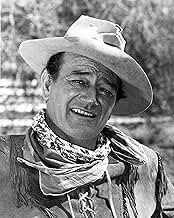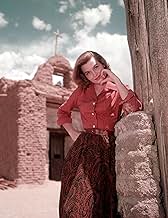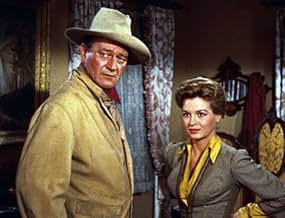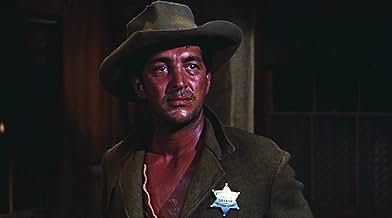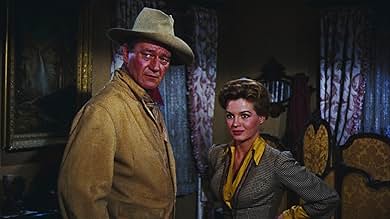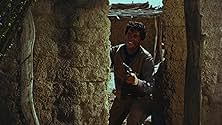Quando lo sceriffo Change arresta Joe Burdette, accusandolo di omicidio, la cittadina di Rio Bravo, viene assediata da un pugno di uomini che impediscono allo sceriffo di comunicare con l'es... Leggi tuttoQuando lo sceriffo Change arresta Joe Burdette, accusandolo di omicidio, la cittadina di Rio Bravo, viene assediata da un pugno di uomini che impediscono allo sceriffo di comunicare con l'esterno e chiedere aiuto. La gente di Rio Bravo è spaventata.Quando lo sceriffo Change arresta Joe Burdette, accusandolo di omicidio, la cittadina di Rio Bravo, viene assediata da un pugno di uomini che impediscono allo sceriffo di comunicare con l'esterno e chiedere aiuto. La gente di Rio Bravo è spaventata.
- Regia
- Sceneggiatura
- Star
- Premi
- 4 vittorie e 5 candidature totali
- Carlos Robante
- (as Pedro Gonzalez-Gonzalez)
- Jake (Stage Driver)
- (scene tagliate)
- Harold
- (scene tagliate)
- Cowboy
- (scene tagliate)
- Barfly
- (non citato nei titoli originali)
- Barfly
- (non citato nei titoli originali)
- Charlie
- (non citato nei titoli originali)
- Barfly
- (non citato nei titoli originali)
- Bartender
- (non citato nei titoli originali)
Recensioni in evidenza
Rio Bravo is a sprawling pressure cooker. For anyone not used to the pacing of older films, this is not the best place to begin. Uninitiated audiences are likely to find it boring--the plot is relatively simple, and they would likely have a difficult time remaining with Rio Bravo for its 2 hour and 21 minute running time. It's best to wait until one is acclimated to this kind of pacing, so as not to spoil the experience. The film is well worth it.
John Wayne was an enthralling paradox, and maybe no film better demonstrates why than Rio Bravo. He had almost delicate "pretty boy" looks and a graceful gait that were an odd contrast to his hulking height and status as the "action hero" of his day. He speaks little, and doesn't need to, although he is the star and thus the center of attention. He tends to have an odd smirk on his face. Wayne's performance here interestingly parallels the pacing and tenor of the film--that's not something that one sees very often, or at least it's not something that's very easy to make conspicuous.
And he's not the only charismatic cast member. Dean Martin, Ricky Nelson, Walter Brennan and Angie Dickinson are equally captivating. Even when the full blow-out action sequence begins (and that's not until about two hours into the film, although there are a few great shorter action scenes before that), the focus here is still on the interrelationships between these characters, with Brennan the continually funny comic foil, Nelson the suave, skilled youngster, Martin the complex and troubled but likable complement to Wayne, and Dickinson as the sexy, forward and clever love interest.
Director Howard Hawks seems to do everything right. He guides cinematographer Russell Harlan in capturing subtly beautiful scenery--like the mountains in the distance over the tops of some buildings, and a great sunrise shot--and asks for an atmospheric score (such as the repeated playing of Malaguena by a band in the background) that shows that plot points weren't the only element of the film that influenced John Carpenter (who partially based his Assault on Precinct 13 (1976) on this film). But most intriguing is probably Hawks' staging/blocking. You could easily make a study of just that aspect of the film. The characters are always placed in interesting places in the frame, and they're constantly moving in interesting ways throughout the small collection of buildings and streets that make up the town. There is almost a kind of performance art aspect to it. Wayne, for instance, repeatedly touches base at the jail, then picks up his rifle, circles around to the hotel and back, almost as if he's doing some kind of western Tai Chi.
Rio Bravo is nothing if not understated, and as such, it may take some adjustments from modern, especially younger, viewers. But it's a gem of a film, and worth watching and studying.
Action western, an agreeable love story , shoot-outs at regular intervals , and humor abound in this magnificent film whose characters are splendidly portrayed . It packs larger-than-life roles , uproarious events and lively happenings . The Duke carries strong acting on his brawny shoulders and perfectly does . The picture is mainly lifted out by veteran Brennan's wonderfully acting as a half-crazed likable old man , whose finger itches demoniacally on the trigger every time he gets a nasty guy in his sights . And of course , top-drawer Dean Martin with an unexpected excellent performance as alcoholic sheriff . Colorful Technicolor cinematography by cameraman Russell Harlan who adds much to the setting of this unique Western. Marvelous musical score by Dimitri Tiomkin including the Mexican ¨Degueyo¨, music also played during ¨John Wayne's Alamo¨ siege. This overlong , too much-acclaimed and very gripping Western will appeal to John Wayne fans. Rating : Above average, essential and indispensable Western , a masterpiece horse opera whose reputation has improved over the years.
Subsequently , Howard Hawks shot ¨El Dorado¨ in similar style with a hot-headed James Caan as Mississipi who is a virtual retreat of the previous young sidekick named Colorado-Ricky Nelson . Howard Hawks also displays a number of similarities to the posterior ¨Rio Lobo¨ starring Wayne, Victor French, Jorge Rivero and again with an old short-tempered person played by Jack Elam . Furthermore, a semi-remake on modern times by John Carpenter was called ¨Assault on Precinct 13¨.
One thing I noticed as I saw this film again today is that it is so much better than I'd remembered. Some of this might be because there are a lot of details about films and film making I notice now that I have a bazillion film reviews behind me--I couldn't help but learn a little bit after seeing so many films. Some of it might also be that despite me knowing the plot and knowing exactly what would happen, it just didn't get old--it was that well made.
Now the plot itself is amazingly simple and is not 100% new (hence, my giving the film a 9). The idea of a lawman or group of lawmen refusing to give up a murderer to a rich and powerful boss and steadfastly enforcing the law is such a classic plot line. However, this film is a great example of taking a standard plot yet making it come alive due to such incredibly deft direction. Howard Hawks was a master director with a ton of wonderful films to his credit. You can really tell he knew his craft, as he brought so much out of the actors and situation. In some ways, I even preferred it over the John Ford style, as Ford is usually very, very heavy on the sentimentality. Here, while there is a tiny bit, the emphasis seems to be more on character development, redemption and the individual's interactions with each other. Somewhat similar to Ford--just with less of the lovely schmaltz that Ford did so well. I love both style--and it's amazing that Hawks really only made a few Westerns.
In some ways, this film seems a bit surprising for a John Wayne film. While Wayne is naturally known for his extreme manliness in his movies, here he is more complex and vulnerable. First, his romantic pairing with a much younger Angie Dickenson is odd but somehow they make it work and bring out a bit more complexity to his character. Second, there is a lot of wonderful male bonding in the film--and a lot of tenderness. This is not a homophobic film, as the men truly seem to love and care for each other in a way you often don't see in Westerns. It's not all toughness but the vulnerability of the characters (especially Dean Martin) was endearing. Also, while it was very, very atypical of Wayne, I loved the scene where he kissed Walter Brennan on top of the head--it was wonderful and made me laugh. It's funny, because as it was about to happen I said to myself that if Wayne should kiss Brennan, it would be the perfect scene...and then he did!
One thing that worried me about the film was that in several Wayne films of the late 50s and into the early 70s, Wayne had young pop singers play important roles. While this sometimes worked, sometimes the acting and characters didn't really pan out well (such as Bobby Vinton playing Wayne's son in BIG JAKE). Here, fortunately, Ricky Nelson actually was a positive addition. Not only did his acting seem polished (after years of playing on "Ozzie and Harriet") but his singing actually worked well--even if the style was anachronistic to the Old West. I particularly liked his little duet with Dean Martin. As for Martin, he showed that despite the Matt Helm films and his laid back attitude towards acting in the 70s, he was a terrific actor.
As for everyone else, they were in top form. Wayne was a gentler and more believable guy--but still the John Wayne everyone wanted to see. Walter Brennan was downright hilarious as the cantankerous old cuss he grew into in his later years (though he was actually a bit younger than he looked and acted). Angie Dickenson also had more depth and appeal than usual. Interestingly, Hawks and the script put so much emphasis on the good guys that the bad guys were almost an after-thought. This isn't a bad thing, as the film chose instead to deal with the way the good guys got along and worked together as friends.
Exceptional direction, great acting and a top-notch script, this is a fine film and one any fan of Westerns or John Wayne simply has to watch. I liked the trivia section of IMDb and its entry that says "Quentin Tarantino has said that before he enters into a relationship with a girl, he always shows her 'Rio Bravo' and if she doesn't like it, there is no relationship." I would agree. Anyone who doesn't like this film after seeing it isn't to be trusted!
By the way, although I love this film, I am less in love with EL DORADO. A decade later, Hawks basically redid RIO BRAVO (again, with Wayne) and it offers no improvements at all over the original. Hawks denied that it was a remake and if you believe that, I'll sell you some oceanfront property in Colorado! It's watchable, but you see the two side-by-side, there's simply no comparison.
Rio Bravo boasts a stellar cast in John Wayne, Dean Martin, Ricky Nelson, and Angie Dickinson. It's a classic Western film that strays from themes related to the genre. Instead of the stereotypical outlaw vs. sheriff theme, Rio Bravo forces the audience to analyze each character and how their unique backstories explain their actions.
One of Rio Bravo's defining features is that, unlike other Westerns, there isn't an overwhelming protagonist. Instead, each of the characters are seen grappling with their own issues and finding their place in the story.
All four of our main characters are deputies in the town. John Wayne plays the sheriff and acts as the calm and steady voice of reason in the story. Dean Martin plays Dude, a has-been who delved into alcoholism after he was left by a woman. There's Stumpy, the crippled grandpa and a young, talented new guy. The interactions between all the other characters is quite interesting, especially the chemistry between Chance and Dude.
Methodically speaking, this is a really good movie whether you like Westerns or not. The writing is really good, and the direction especially is remarkable. Each scene is intricately set up. I want to bring special attention to the opening scene. There's no dialogue, and we don't fully find out what transpired until later. The opening scene really pulled me in, and set this up to be a really solid film.
Unfortunately, the run-time is a bit long. As the movie progresses, Feathers and Stumpy started really annoying me. There's a shootout scene that's really good, but the closing scene is anticlimactic and I wish the movie had ended better for the sake of the story.
Despite all the praise I can offer Rio Bravo, I just don't think it warrants over a 7 rating. The scenes with Feathers are too drawn out, and I think we'd have a better story if her character was removed completely. Nonetheless, this is definitely a good Western to see if you appreciate character development, dramas, and John Wayne.
No character empathises this more than Dean Martin's broken down drunk Dude. Nicknamed "Borachon" by the Mexicans (Borachon is Spanish for "Drunkard") Dude battles with the demons that drove him to drink as he desperately tried not to let down Sheriff Chance, John Wayne, who believes in him more than he believes in himself. Dude's pouring back of a glass of bourbon into the bottle is one of the most life affirming scenes ever committed to film.
Wayne never really does anything other than play John Wayne and Hawks spins on this playing with the ethos of the man. The same steadfast values that mean Wayne's Sheriff John T. Chance will not release the prisoner Joe Burdette back to his murderous gang leave him stiff and awkward in front of Angie Dickinson's love interest "Feathers" creating perhaps the quintessential John Wayne movie in which the Jules Furthman and Leigh Brackett's screenplay explores the depths of the ideals that Wayne stands for. This is a movie about not just about redemption, but about the reasons for a tough redemption in a World in which collapse and lawlessness are easier options.
And when Dude pours his Bourbon back, affirming that even though he cannot be the man he was but he can still be a good man, you will not be wishing it was film in bullettime.
Lo sapevi?
- QuizThe sets in Old Tucson are built to 7/8th scale, so the performers look larger than life.
- BlooperAt night when Dude and Chance are making their rounds, the camera follows Dude as he walks briefly off the set. A huge concrete pillar that he walks past can be seen.
- Citazioni
Feathers: I thought you were never going to say it.
John T. Chance: Say what?
Feathers: That you love me.
John T. Chance: I said I'd arrest you.
Feathers: It means the same thing, you know that.
- ConnessioniEdited into La classe américaine (1993)
I più visti
Dettagli
Botteghino
- Lordo in tutto il mondo
- 27.763 USD
- Tempo di esecuzione2 ore 21 minuti
Contribuisci a questa pagina




